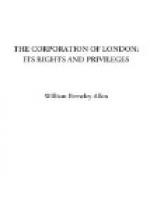warned him, when too late, that he had gone too far.
Anxious to make friends in his hour of extremest
peril, he despatched the infamous Jefferies to Guildhall
to announce the restoration of the ancient privileges
of the City. But the citizens were not thus to
be cajoled. No sooner had the king set out to
join his forces, than the Court of Aldermen declared
themselves in favour of the Prince of Orange, as the
champion of civil and religious freedom. The
Lord Mayor, the aldermen, and fifty common councillors,
had a seat and voice in the convention which pronounced
the deposition of James, and the elevation to the
throne of William and Mary. The first act of
the nation was to establish and perpetuate a constitutional
form of government, and this was accomplished by passing
the famous statute known as the Bill of Rights.
Experience had proved the vital importance of placing
the privileges of the City of London beyond the caprice
of the sovereign and the possibility of a coup d’etat.
It was therefore declared by Parliament that the
judgment passed on the quo warranto of Charles II.
was unjust and illegal, and that all the proceedings
in the case were informal and void. It was further
enacted, “that the mayor, commonalty, and citizens,
should for ever thereafter remain a body corporate
and politic, without any seizure or forejudger, or
being thereof excluded or ousted, upon any pretence
of forfeiture or misdemeanour whatsoever, theretofore
or thereafter to be done, committed, or suffered.”
The constitution of the corporation was nevertheless
subsequently violated by the statute of 11 Geo. I.,
which conferred on the livery the elective franchises
exercised in common hall. By a still more recent
act, 12 & 13 Victoria, the right of voting in the
election of aldermen and common councilmen has been
further extended and enlarged. It was then enacted
that that privilege should belong to every freeman
of the City rated at 10 pounds per annum to the police
or any other rate, and registered among the voters
for the city of London at elections of members to
serve in Parliament. Still greater innovations
are now in contemplation, in violation of law and
usage, and in defiance of prescriptive right, royal
charters, and parliamentary statutes.
Audax omnia perpeti, Gens humana ruit per vetitum
nefas.*
* The materials for this slight sketch have been gathered
from Norton’s “History and Franchises
of the City of London;” Dr. Brady’s learned
dissertation on Boroughs; and Herbert’s “History
of the Twelve Livery Companies.”
PART I.
THE CORPORATION AS IT IS.
The Municipal Constitution—Lord Mayor—Aldermen—Court
of Common Council—Citizens—The
Livery Companies—Sheriffs—Law
Courts—Public Charities—Conservancy
of the Thames—Metage Dues.
In the preceding hasty sketch it has been attempted
to trace the rise of London from being the bazaar
to a Roman camp to its present position as the capital
of the commercial world. It is now worth while
to glance at the nature of the municipal institutions
through which it has attained such a proud ascendancy.*




